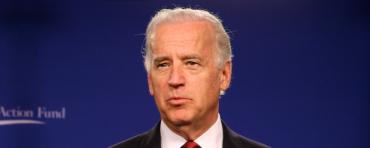
On Thursday, former Vice President Joe Biden launched a bid for the White House--but history is against his presidential ambitions.
While he stumbled out of the gate in the 1988 election and never took off despite some solid debate performances in 2008, on paper at least, Biden would have been a better presidential candidate for Democrats in 2016 than Hillary Clinton was. He didn’t have her baggage and probably would have done better than Clinton did with blue-collar voters in states like Pennsylvania, Ohio, Wisconsin and Michigan--something Biden hopes will give him a boost in 2020 and perhaps an edge over President Donald Trump.
But history offers little encouragement for Biden as he makes another try at the presidency. With the exception of Richard Nixon, former vice presidents who have been out of office fare poorly when they make bids at the White House. This was especially true in the 19th century. John C. Calhoun, who was vice president under John Quincy Adams and Andrew Jackson, may have been one of the most important political leaders in the first half of the 19th century but his efforts to win the presidency went nowhere. While the presidential race was wide open in 1844, Richard M. Johnson, who was vice president under Martin Van Buren, never materialized as a major contender that year. Levi Morton, who was Benjamin Harrison’s understudy, didn’t have much of a chance against William McKinley at the 1896 Republican convention.
Things didn’t change much in the 20th century. Charles Fairbanks, who was often at odds with Theodore Roosevelt when he was his vice president, lost out to Charles Evans Hughes as the GOP looked for a candidate to topple Woodrow Wilson in 1916. Undeterred, Fairbanks decided to seek his old job back as Hughes’ running mate but Wilson won the general election. After FDR dumped him from the ticket in favor of Harry Truman, Henry Wallace made a leftist third-party presidential bid in 1948 but fared poorly.
Nixon, who spent eight years as Dwight Eisenhower’s vice president, bounced back from the 1960 presidential election and losing the 1962 California gubernatorial election to win the presidency in 1968. His Democratic opponent--Hubert Humphrey who was LBJ’s vice president--wasn’t as fortunate. Humphrey returned to the U.S. Senate but he lost out to George McGovern in the Democratic primaries in 1972. Supporters tried to get Humphrey to run one more time in 1976 but he stayed out of the race, encouraging fellow Minnesota Democrat Walter Mondale to run.
Mondale went on to be Jimmy Carter’s vice president but his presidential ambitions were dashed in 1984 when Ronald Reagan buried him in a landslide. While George H.W. Bush became the first sitting vice president to be elected president in his own right since Van Buren won the presidency in 1836, his understudy didn’t fare as well when he ran for president. Dan Quayle sought the Republican presidential nomination in the 2000 election cycle but his campaign never got on track. Quayle bowed out after a poor performance in the Iowa strong poll.
At the very least, it’s safe to say Biden won’t try to follow the footsteps of two former vice presidents who ran for their old jobs. Besides Fairbanks, Adlai Stevenson, Grover Cleveland’s second vice president and the grandfather of the future presidential hopeful, was William Jennings Bryan’s running mate in 1900, four years after his vice presidency ended.
While there are some exceptions, including Nixon and Bush, most former and sitting vice presidents stumble when they run for president. Sitting vice presidents are often lost in the shadows of their bosses while the public usually forgets about former VPs.
Biden, of course, faces other hurdles as well if he tries again for the White House. He’ll turn 78 in November 2020 and has been on the political stage for well over four decades. If voters are hungry for change--like they were in 1992, 2000, 2008 and 2016--Biden doesn’t exactly fit the bill. Even as he leads in most polls for the moment, history provides little encouragement as Biden makes one last charge at the presidency.


